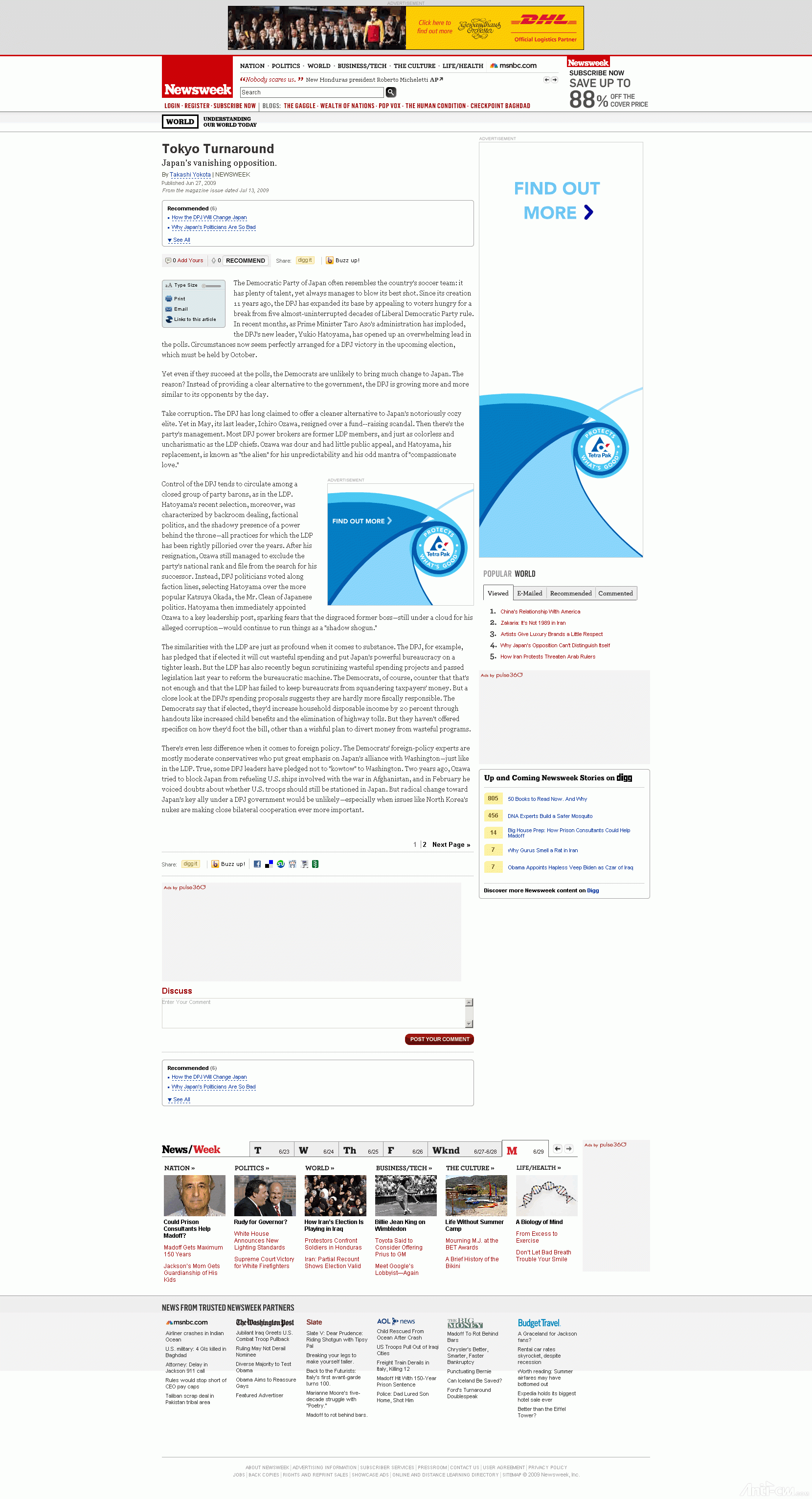|
|
Tokyo Turnaround
Japan's vanishing opposition.
http://www.newsweek.com/id/204317
By Takashi Yokota Published Jun 27, 2009
The Democratic Party of Japan often resembles the country's soccer team: it has plenty of talent, yet always manages to blow its best shot. Since its creation 11 years ago, the DPJ has expanded its base by appealing to voters hungry for a break from five almost-uninterrupted decades of Liberal Democratic Party rule. In recent months, as Prime Minister Taro Aso's administration has imploded, the DPJ's new leader, Yukio Hatoyama, has opened up an overwhelming lead in the polls. Circumstances now seem perfectly arranged for a DPJ victory in the upcoming election, which must be held by October.
Yet even if they succeed at the polls, the Democrats are unlikely to bring much change to Japan. The reason? Instead of providing a clear alternative to the government, the DPJ is growing more and more similar to its opponents by the day.
Take corruption. The DPJ has long claimed to offer a cleaner alternative to Japan's notoriously cozy elite. Yet in May, its last leader, Ichiro Ozawa, resigned over a fund--raising scandal. Then there's the party's management. Most DPJ power brokers are former LDP members, and just as colorless and uncharismatic as the LDP chiefs. Ozawa was dour and had little public appeal, and Hatoyama, his replacement, is known as "the alien" for his unpredictability and his odd mantra of "compassionate love."
Control of the DPJ tends to circulate among a closed group of party barons, as in the LDP. Hatoyama's recent selection, moreover, was characterized by backroom dealing, factional politics, and the shadowy presence of a power behind the throne—all practices for which the LDP has been rightly pilloried over the years. After his resignation, Ozawa still managed to exclude the party's national rank and file from the search for his successor. Instead, DPJ politicians voted along faction lines, selecting Hatoyama over the more popular Katsuya Okada, the Mr. Clean of Japanese politics. Hatoyama then immediately appointed Ozawa to a key leadership post, sparking fears that the disgraced former boss—still under a cloud for his alleged corruption—would continue to run things as a "shadow shogun."
The similarities with the LDP are just as profound when it comes to substance. The DPJ, for example, has pledged that if elected it will cut wasteful spending and put Japan's powerful bureaucracy on a tighter leash. But the LDP has also recently begun scrutinizing wasteful spending projects and passed legislation last year to reform the bureaucratic machine. The Democrats, of course, counter that that's not enough and that the LDP has failed to keep bureaucrats from squandering taxpayers' money. But a close look at the DPJ's spending proposals suggests they are hardly more fiscally responsible. The Democrats say that if elected, they'd increase household disposable income by 20 percent through handouts like increased child benefits and the elimination of highway tolls. But they haven't offered specifics on how they'd foot the bill, other than a wishful plan to divert money from wasteful programs.
There's even less difference when it comes to foreign policy. The Democrats' foreign-policy experts are mostly moderate conservatives who put great emphasis on Japan's alliance with Washington—just like in the LDP. True, some DPJ leaders have pledged not to "kowtow" to Washington. Two years ago, Ozawa tried to block Japan from refueling U.S. ships involved with the war in Afghanistan, and in February he voiced doubts about whether U.S. troops should still be stationed in Japan. But radical change toward Japan's key ally under a DPJ government would be unlikely—especially when issues like North Korea's nukes are making close bilateral cooperation ever more important.
The truth is that the closer you look at the DPJ's policies, the murkier they start to seem. Since taking charge, Hatoyama has proved a lousy communicator, giving little sense of what he'd do as prime minister. During a parliamentary debate with Aso on June 17, the opposition leader promised he would "reveal [the DPJ's] policy differences with the LDP." Yet all he offered was a sentimental call to "value people's lives." He has yet to explain what his promise of "compassionate love" would mean in real policy terms—saying only that he "is starting to have a clearer image of it in [his] mind."
To be fair, Japan is no longer a country with stark ideological differences on policy, as key issues like pension and budget reform are so complicated they tend to get bogged down in minute detail. As a result, "it's difficult to make black-and-white distinctions in Japan's political culture," says Kazuhisa Kawakami, a politics professor at Meiji Gakuin University. Yet unless the DPJ finds some clear way of really distinguishing itself before the election, the languishing LDP could close the gap—leaving Japan's opposition in danger of missing yet another shot at bringing real change to Japan.


|
|